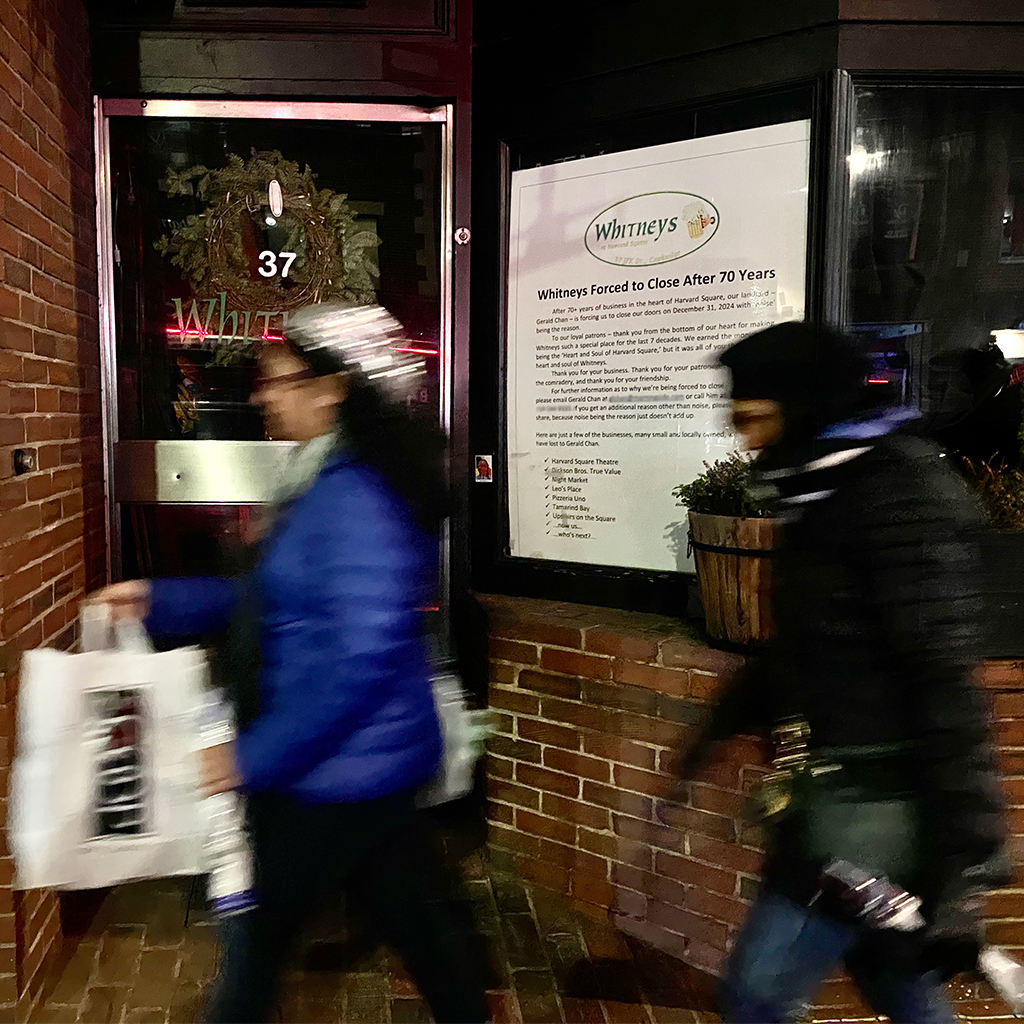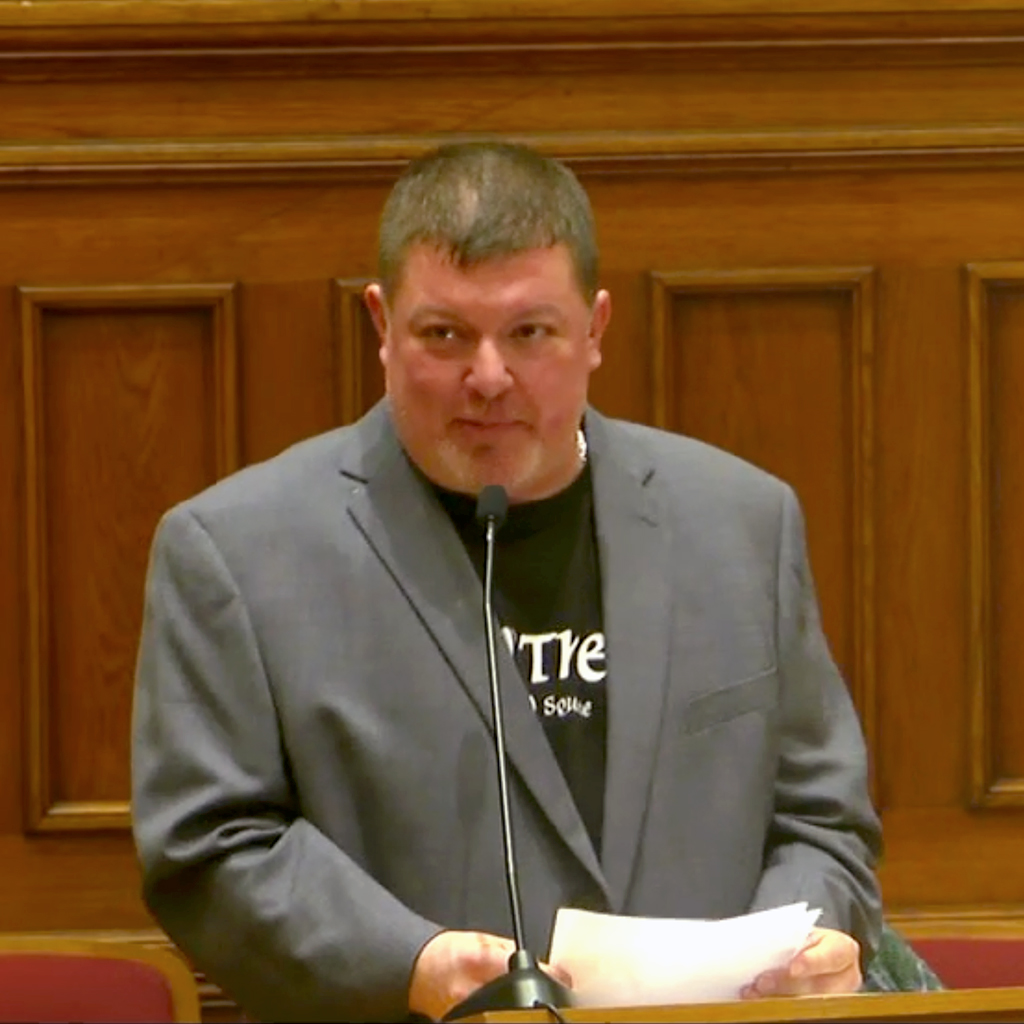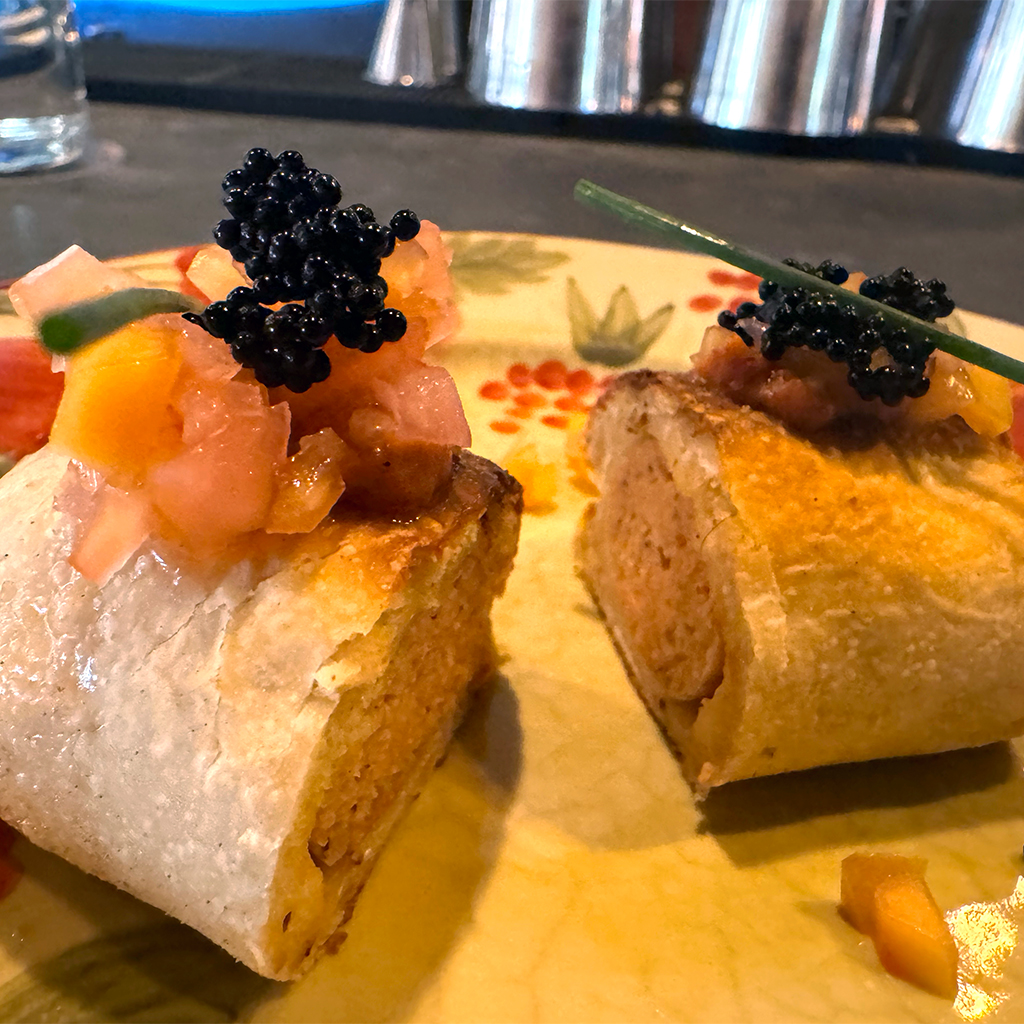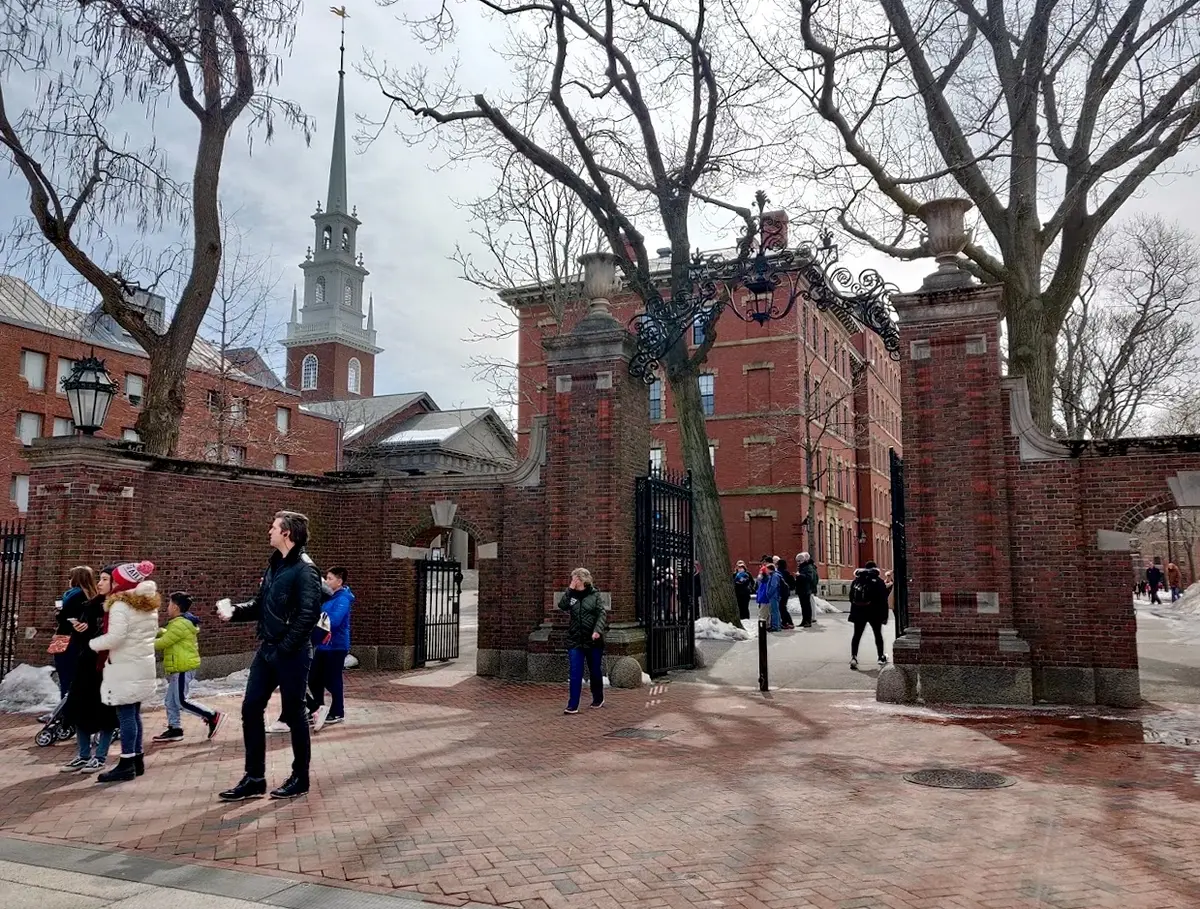By Marc Levy
Tuesday, December 17, 2024

Whitney’s of Harvard Square on Monday, after Cambridge city councillors discussed its expected closing. An email address and phone number on the sign have been blurred. (Photo: Marc Levy)
The potential forced closing of 71-year-old bar Whitney’s of Harvard Square has Cambridge city councillors pleading with the landlord for “a reprieve” to see if the sides can find a way to keep the historic business open.
The response by fans of the bar to its expected closing by Jan. 1, though, is making that harder, because the bar’s owner has posted a sign in its 37 John F. Kennedy St. window asking them to support Whitney’s directly – calling or emailing the building’s owner, billionaire Gerald Chan. And he gives Chan’s email address and phone number.
Councillors issued a different plea to bar owner, Dan McGuire: to take down the sign.
“I know that you can’t control everything people say, but I would encourage the people who are supporting Mr. McGuire to stop making comments like he should ’Hire Luigi to take care of the problem,’” councillor Paul Toner said. Luigi Mangione is a suspect in the Dec. 4 killing of millionaire health insurance executive Brian Thompson. It’s turned Mangione into a folk hero among people angry over industry practices.
Councillor Sumbul Siddiqui agreed with Toner: “I want to support local businesses. I can’t condone personal threats.”
An executive of the property owner, Mayhaw LLC, told councillors in a letter that over the past several days, Whitney’s has “engaged in a coordinated public relations effort that incited racist, hate and violent personal threats against a member of the local community.”
The sign in the Whitney’s window does not call for hate or threats, but does suggest people call Chan directly to ask about the closing and notes other Harvard Square institutions that have been “lost” to Chan’s ownership, including Leo’s Place Diner, which lasted 32 years as a neighbor to Whitney’s; restaurants Night Market, Tamarind Bay, Pizzeria Uno and Upstairs on the Square; and Dickson Bros. Hardware and the AMC Loews Harvard Square 5, neither of which Chan closed, but has kept empty long enough to draw widespread ire. Councillors gave Chan an ultimatum in 2017, around five years into the disuse of the former AMC theater, that if he didn’t present plans for the space they might talk about seizing the property.
“The theater has sat vacant for 10 years. Dickson Bros. for, I think, four. And you know, that’s forgoing a whole lot of rent and money” in comparison to the $44,800 in back rent owed by Whitney’s, vice mayor Marc McGovern said. That “is peanuts in Mr. Chan’s portfolio,” while Whitney’s is “really a valued institution in this city.”
“There’s got to be a better way to do this,” McGovern said.
Differing accounts
Bar owner McGuire and property owner Mayhaw give different reasons for the expected closing, and different accounts of why $44,800 in back rent is being discussed. In the Mayhaw version presented by White, the property owner gave Whitney’s significant breaks on rent during and after the Covid pandemic and offered in January 2021 to let the bar take part in building power upgrades – but McGuire “chose not to connect to the power upgrade and never raised this matter further,” then stopped paying rent in November 2023.
As McGuire explains it, Eversource did a power upgrade that Whitney’s expected to be part of, and when the bar didn’t benefit “I was reaching out, saying, ‘What’s going on with the upgrade?’ I wanted to expand my kitchen, build sales. No response, no response, no response. Finally, I started withholding the rent” and put it into an escrow account until the issue was worked out – a situation complicated by property management turnover. When his Fat Heady LLC finally heard from Mayhaw, it was with an order to leave over noise issues.
White does not raise noise issues in an explanation to councillors about why Mayhaw wants Whitney’s to vacate, and said McGuire “has never raised the issue of a rent escrow, nor nonpayment due to repairs.”
Councillors diverge
Support for a local business and McGuire was enough for McGovern and councillor Ayesha Wilson to ask to be added to Mayor E. Denise Simmons’ late resolution about Whitney’s.
Councillor Patty Nolan, meanwhile, said she couldn’t support the order at all given “a long timeline of ways in which legal settlements were signed [and there was] a legal agreement to vacate the space on the part of Whitney’s.”
“Since I don’t know the full story,” advocating for the overturning of a signed legal agreement is “uncomfortable for me,” Nolan said.
For Simmons, trying to bring the sides back to the table was just an attempt to hold onto a historic part of Cambridge. If not a dive bar, Whitney’s is the closest thing to it in Harvard Square.
“As the community changes, these institutions and the history that they have about them go away. Harvard Square – this is not a criticism, it’s just a fact – is getting more and more upscale,” Simmons said. “Any opportunity to be had that we can hold on to just a good, old, regular place to go, it’s something that we should at least raise our voices for.”
The owner’s take

Dan McGuire, owner of Whitney’s of Harvard Square, speaks Monday to the City Council in an image from Cambridge city video.
McGuire told the council that as a native Cantabrigian who grew up eight blocks from Whitney’s and was a longtime customer before buying it, the history is part of why he returned after four years in another state. “I love this city. Whitney’s, to me, embodies what I love about Cambridge. We are town and gown, and who comes into Whitney’s is everyone from the local residents and merchants to established professors,” he said. “Whitney’s is the best of Cambridge … a place where the town and gown can come together.”
The humbleness of Whitney’s – which is below and in the center of Chan’s businesses and offices – may be what Mayhaw dislikes, McGuire said in an interview.
“I started hearing rumors that it wasn’t the image that he liked, and I fought for five years now to hold on to the original look,” McGuire said. “If you look at everyone around me, they’re all 8-foot-tall glass windows, very cold, very corporate, which is the look he is going for. Ever since they moved upstairs, I guess they’ve been more and more unhappy.”





